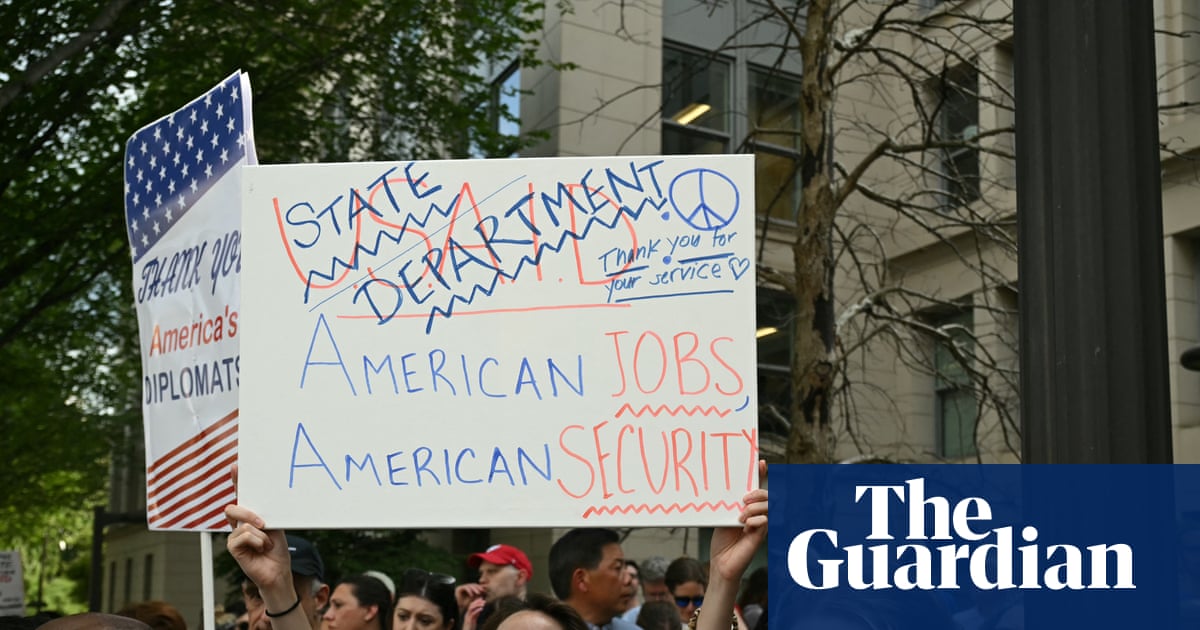The State Department’s Struggles Amidst Cuts and Ideological Shifts
Workers at the US State Department are navigating turbulent waters as the Trump administration’s policies reshape the agency significantly. Reports indicate that firings, resignation buyouts, and a staggering proposed budget cut of 48% have combined to create an atmosphere of low morale among staff. This situation is not just a temporary disruption; experts warn of long-term impacts on various critical programs and the overall functioning of the department.
The Shadow of Firings and Resignation Buyouts
On July 11, over 1,350 employees received Reduction In Force (RIF) notices, impacting approximately 15% of the State Department’s domestic workforce. This mass reduction follows the Supreme Court’s lifting of injunctions that had previously blocked such drastic measures. In total, around 3,000 employees have left the agency through RIF, early retirement, or resignation buyouts.
During a Senate committee hearing on July 16, Deputy Secretary of State for Management and Resources, Michael Rigas, asserted that these cuts were based on a thorough analysis following consultations with senior leadership. However, employees have pushed back against this narrative. Jose Mercado, who spent nearly three decades at the department before being laid off, vehemently refuted Rigas’s claims, stating that the process was opaque and lacked the necessary oversight.
Mercado emphasized that the decision-making appeared to be top-down, a drastic deviation from the norms established over decades. He noted, “This was not done within the confines of the law. The procedures were rewritten so they could do this.” Such sentiments are echoed by the American Federation of Government Employees, which is gearing up for legal challenges to the RIF process.
Ideological Shifts: From Service to Politics
The reduction in staff has not been the only worrying development within the State Department. Many programs aimed at supporting marginalized communities—such as those focused on LGBTQ+ rights, maternal and reproductive health, and minority rights—have been cut or severely diminished in favor of policies aligning with far-right ideologies. A 26-year-old senior adviser, a Trump appointee, is at the forefront of these changes, raising eyebrows among career diplomats.
As a policy Adviser at the department anonymously cited, navigating these turbulent ideological waters has led to significant changes in departmental culture. Staffers now find themselves restricted in how they can engage with external organizations and embassies, with approvals now needing to go through senior leadership—an unprecedented move in the department’s history. This shift reflects an alarming trend towards prioritizing political sensitivities over established diplomatic practices.
Impact on National Security
The diminishing focus on human rights and certain diplomatic missions has raised concerns about the implications for national security. The decision to prioritize far-right policies has sidelined areas that many experts consider crucial for effective U.S. diplomacy. As staff members have observed, this not only weakens the United States’ position abroad but also threatens to compromise the integrity and ethical considerations that underpin international relations.
Critics within the department have pointed out that essential components of annual human rights reports—critical documents submitted to Congress—have been stripped of their references to issues that don’t align with the administration’s “America First” priority. This loss of reporting can lead to a misguided understanding of global human rights conditions among U.S. policymakers.
Morale and Anti-Union Sentiment
The morale within the State Department has taken a noticeable dip in recent months. With impending cuts looming, a culture of self-preservation—summed up as “keeping your head down”—has set in. Employees have expressed concerns that the political climate has created a chilling effect, restricting open dialogue and transparency.
The ongoing anti-union sentiment is palpable, as staffers note an increase in distrust and fear of retaliation against those who speak out. For many, this isn’t just a workplace concern; it translates to personal safety and job security, contributing to a general decline in trust towards leadership.
The Consequences of Institutional Knowledge Loss
Long-serving employees like Mercado have raised alarms about the long-term implications of cutting experienced personnel. The institutional knowledge amassed over years, even decades, is not easily replaced. Mercado articulated that the loss of experienced staff would deeply impact the agency’s ability to carry out essential functions.
When employees are excluded from decision-making and policy formulation, the checks and balances that normally exist begin to erode. This can potentially lead to misguided diplomatic efforts and a lack of critical oversight regarding human rights issues globally. Mercado noted, “We served as a check and balance… what you would consider as watchdogs when it comes to human rights and democracy.”
The Voices of Concern
The push against the department’s mental and operational upheaval is gaining traction, with individuals within the agency voicing serious concerns. A policy adviser pointed out the dangerous implications of reducing support for human rights, emphasizing that cutting staff has national security ramifications.
Critics argue that current cuts create vulnerabilities in the U.S. foreign policy landscape. There are echoes of sentiment from the Department of Defense under former Secretary Jim Mattis, who argued for a balanced investment in diplomacy to mitigate the need for military intervention. The message remains clear: neglecting diplomatic and human rights initiatives may ultimately necessitate more arms spending as military conflicts arise in the absence of sound foreign policy strategies.
The ramifications of these developments continue to unfold, leaving many inside and outside the State Department anxious about the future of American diplomacy and its consequences on a global scale.


